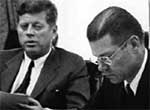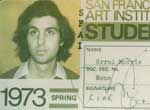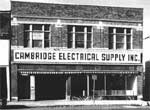There Is Such a Thing as Truth
NPR, All Things Considered - May 2, 2005
I believe in truth. And in the pursuit of truth.
When I was ten years old, I asked a neighborhood kid who was older than me: Which city is further west: Reno, Nevada or Los Angeles, California? The correct answer is Reno, Nevada. But he was convinced that it was the other way around.
He was so convinced that Los Angeles was west of Reno that he was willing to bet me two bucks. I went into the house to get my Rand McNally Atlas. (When I was nine I had spent hours with a rectangular reading glass looking at the names of all the mountains in each state and writing them down in order of their height. My mother pointed out that I could make better use of my time. She was right.)
The kid looked at the atlas and said: The map is drawn funny. It wasn't. Was his argument that the map didn't preserve east, west, north and south? What kind of map would that be?
I showed him that if you trace down the 120-degree west line of longitude -- which runs almost right through Reno, Nevada -- you end up somewhere west of Los Angeles in the Pacific Ocean,
He replied that lines of longitude don't cross the ocean.
What?
I told him that the lines of longitude were there purposely to indicate how far west (or east) some location was, regardless of whether it was on land or on sea.
There was one insurmountable problem, however. He was bigger than me. And I never got my two dollars.
I drew a number of conclusions from this story.
There is such a thing as truth, but we often have a vested interest in ignoring it or outright denying it.
Also, it's not just thinking something that makes it true. Truth is not relative, it's not subjective. It may be elusive or hidden. People may wish to disregard it. But there is such a thing as truth. And the pursuit of truth: Trying to figure out what has really happened; trying to figure out how things really are.
Almost fifteen years ago, I stumbled on a story about an innocent man, a man who had been sentenced to die in the Huntsville, Texas electric chair. And through hard work, luck and a certain amount of pathological obsession, I was able to make the movie "The Thin Blue Line" and to help get him out of prison.
What kept me going was the belief that there had to be answers to the questions: Did he do it? Was he guilty or innocent? If he didn't do it, who did? And that I could find an answers to these questions through investigating -- through studying files, reading transcripts, interviewing people.
It's not that we find truth with a big "T". We investigate, and sometimes we find things out and sometimes we don't. There's no way to know in advance. It's just that we have to proceed as though there are answers to questions. We must proceed as though in principle we can find things out -- even if we can't. The alternative is unacceptable.
I will never know whether the neighborhood kid really didn't understand the logic of my argument about Reno, Nevada. Or whether he understood it completely and just didn't want to admit it. Or whether he understood it and just didn't want to pay up. I'll never know.
All I know is I never got my two dollars.







